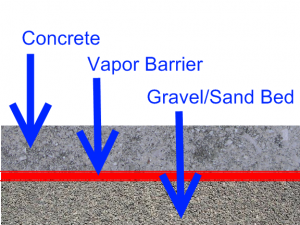Can You Lay Flooring Directly on Concrete Slab?
Concrete slab floors have become, in the last several decades, the predominant way of flooring a house.
While the “traditional” method of building with a raised foundation–joists over a crawlspace or basement–definitely has its merits, there are many parts of the world where concrete slab is the most logical way to go. But how does this fit in with laying down your finish flooring? Can you lay the flooring directly onto the concrete slab? What you’ll find is that some flooring can go right on concrete, while others cannot. Let’s take a closer look…
Concrete Slab Gets Moisture from Below
The main thing to remember is that concrete slab floors is that they receive moisture from the bottom-up. Even though the concrete slab floor is laid onto a sand or gravel bed, moisture does come upward. You cannot escape this moisture. Whether you live in Buffalo or Tucson, Austin or Hawaii, you’ll be getting ground moisture. You many not think so, but it happens.
How Does the Vapor Barrier Come Into Play?
Many kinds of flooring–wood, laminate, engineered–are greatly affected by moisture. Resilient flooring, such as vinyl, linoleum, and other man-made materials, can withstand moisture better. Your concrete slab already has a moisture barrier in place (let’s hope). When the builder laid the concrete, he laid down the sand/gravel bed…and then a plastic vapor barrier…and then he poured the concrete.

Types of Flooring Bonded Directly to Concrete
Think: rot. What kind of flooring material is most subject to rot and deterioration? Which kind is least affected?
Well, you’ve already answered your question:
- Ceramic tile
- Natural stone
- Brick
- Resilient flooring
…can all be installed directly on concrete slab.
Ceramic tile, stone, and brick are such close cousins to the materials used in concrete work that they are largely unaffected by any moisture. Resilient flooring (i.e., vinyl) doesn’t mind if there is moisture, either.